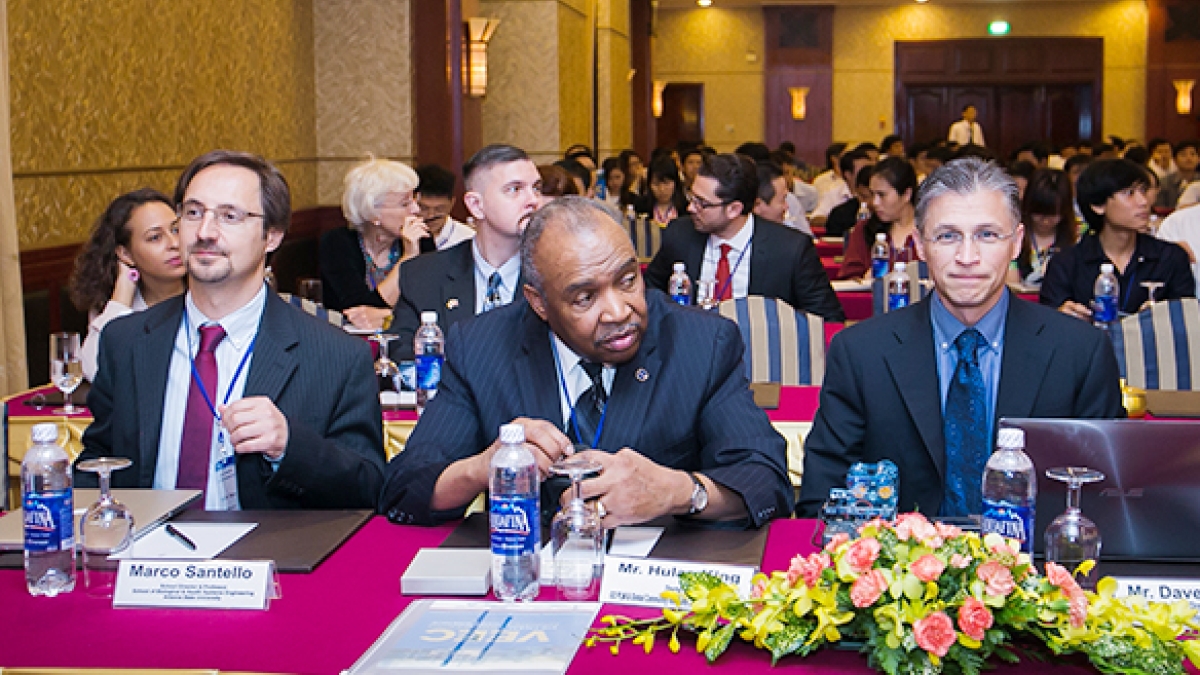ASU expands role in international engineering education alliance

Arizona State University continues to foster stronger international economic, education and research ties through its role in the Higher Engineering Education Alliance Program (HEEAP).
The alliance recently hosted its second annual Vietnam Engineering Education Conference, drawing hundreds of government, industry and academic leaders from the United States and Vietnam. Their goal is to modernize engineering education in Vietnam to produce the more highly trained workforce necessary to boost the growth of the high-tech industry in Southeast Asia.
The conference spurred progress in broadening business and education partnerships between the two countries, as well as setting the stage for open exchanges of research aimed at producing technological innovations, said Jeffrey Goss, an assistant dean in ASU’s Ira A. Fulton Schools of Engineering.
Goss is also executive director of the engineering schools’ Global Outreach and Extended Education, which administers HEEAP.
The alliance was established in 2010 by United States Agency for International Development (USAID) and the Intel Corp., in partnership with ASU. Since then, working in collaboration with the Vietnam Ministry of Education and Training, HEEAP has taken significant steps to advance the teaching of engineering at leading technical universities and vocational training colleges throughout Vietnam.
Hundreds of faculty members at those schools have received high-level instructional training, both in Vietnam and at ASU. A distance-education network has been established that enables students at multiple campuses in Vietnam to get instruction in the same courses simultaneously.
In addition, HEEAP is supporting a program to train education leaders in Vietnam in up-to-date skills for the administration of technical education institutions, including the revenue enhancement and policy development efforts necessary for the schools to be competitive regionally and globally.
Major high-tech companies such as National Instruments, Siemens, Cadence, Danaher and Pearson have beomce HEEAP partners in the past few years.
“We foresee growing the annual HEEAP conference into an event involving more of Southeast Asia,” especially as the Association of Southeast Asian Nations (ASEAN) Economic Community begins implementing its master plan in 2015, Goss said.
William Colglazier, science and technology adviser to the U.S. Secretary of State, U.S. State Department, was a keynote speaker at the conference. Photo courtesy Shalom An Tran.
“At this year’s conference we already had expanded participation from Laos, Thailand, Singapore and the Phillipines, and from more U.S. universities,” he said.
One new HEEAP-related endeavor in the works is a collaboration between ASU and Vietnam National University in Ho Chi Minh City to develop new biomedical engineering research and a product innovation center.
A presentation related to the project was given at the conference by Marco Santello, director of the School of Biological and Health Systems Engineering, one of the Ira A. Fulton Schools of Engineering.
Santello said the collaboration presents an opportunity to design a framework that can guide future efforts to foster international entrepreneurship through partnerships of universities and industry in various countries.
The project is expected to provide opportunities for student and faculty exchanges between ASU and Vietnam universities involving both educational and research activities. Building such mutually beneficial relationships will provide socioeconomic benefits to both countries, Santello said.
In late April, a delegation from Vietnam’s Ministry of Education and Training will visit ASU to discuss the impact of HEEAP and additional collaborations between ASU and the government of Vietnam.
New projects to be discussed during the visit include a joint venture to establish a bi-national master’s degree program in cyber security and a training center to promote doctorate-level engineering education to feed the pipeline for future faculty members at Vietnam colleges and universities.
ASU and Vietnamese officials will also discuss ideas for expanded support of HEEAP’s objectives.
In addition, a senior delegation from the Vietnam Ministry of Science and Technology and the World Bank will visit ASU to discuss ideas on how government, industry and higher education institutions can establish international research centers or institutes that would focus on innovation, entrepreneurship and technology transfer.